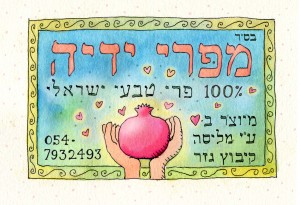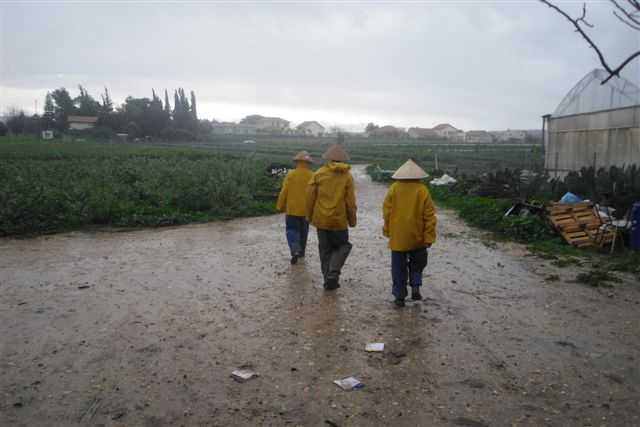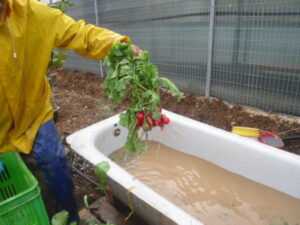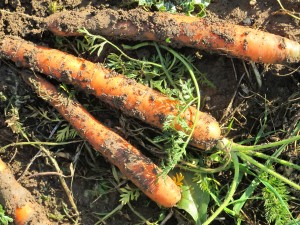Tu B’Shvat celebrations:
 Melissa of Mipri Yadeha is offering 2+1 special: order two fruit leather rolls or dried fruit/crunchies and get the third free.
Melissa of Mipri Yadeha is offering 2+1 special: order two fruit leather rolls or dried fruit/crunchies and get the third free.
Ish Shel lechem Bakery is baking a unique Tu B’shvat loaf: Made of 70% whole wheat organic flour and filled with dried fruits and nuts – Yummy!
Happy birthday trees of Israel!
___________________________________
…and then the sun came out for a minute and a rainbow just stood there, and I remembered returning once from weeding the vineyard, my hands spongy and heavy with black mud.
I said, “Mom, look at this filth.”
I was a kid, you know, and that’s how kids talk.
And she looked at me with her unsleeping eyes and said: “Mud is not filth.”
Yehonatan Geffen
It’s been raining almost nonstop over the past two weeks in a steady sheet of little raindrops, not too heavy or rowdy, just calm, happy rain. There were times when the showers took a one or two-hour break, with an occasional visit by sunrays through the clouds that washed the field with light. But other than these interludes, it’s been wet, wet, wet.
We try to schedule our work according to the rain forecast, and many times we pick most of the vegetables a day before the predicted rain. Still, there’s usually no recourse from picking in the rain, even in heavy showers. We try to dress accordingly: high boots, rainproof pants, storm jackets and umbrella hats, in a hearty attempt to somewhat protect ourselves from the raindrops that keep falling on our heads.

Working in the rain, or a day or two or even three after the rain, means rolling in the mud–and when I say rolling, picture boots loaded halfway with sticky, brown, wonderful, heavy mud. And when I say heavy, picture us walking only by contorting every muscle from hip to toe to be able to lift each foot to take baby steps towards the next garden-bed. On the way back to the packing house, we try to shed as much mud as possible by jumping around, dancing (tap-like), rubbing against flora on the road, and trying to leave as much of the brownness around us. Removing the boot at the end of such a workday is like growing wings. You lose your sense of gravity and get ready to fly…
The entry to our packing house is protected by an awning on top and a concrete-covered pathway, thus some of the mud that used to accompany us into the packing house now remains in clusters at the doorstep. That is also the spot where we pack the boxes into our delivery cars which we cover in cardboard on rainy days. And yet, as we load the vehicles, our delivery people get their share of muddy boots as well…
The carrots, beets, daikons, radishes, fennels and onions come straight from the earth all brown and muddy. Some are eligible for long baths: we soak these vegetables in a tub for an hour or so and then wash them off and let the water drain in netted plastic containers. However, we do not wash off the onions and fennel. Their layered composition makes these vegetables vulnerable to excess water which can penetrate their skin, accumulate, and cause damage. Hence, you receive them covered in mud. The solution is to allow the mud to dry up, after which it crumbles off easily. Whatever’s left, you can safely wash off.
Yet while there is no getting out of thoroughly washing the vegetables, there is an added bonus. Chana, who volunteered here a few winters ago, taught me that mud is a great grease remover. Just as sand is used for cleansing, the muddy globs can rub off stubborn stains, especially from metal utensils. So if you have a pot with black, hard-to-remove stains inside, try this: place the muddy vegetables you receive in your box (carrot, beets, kohlrabi, radishes, celeriac, parsley root, etc.) in the stained pot and cover with water. Now prepare yourself a cup of tea and relax while you choose the recipes on your menu, and let the water do its work, softening the mud and separating it from the vegetables. After some time (a couple of hours or so), go back to your muddy vegetables, remove from pot, and wash under running water. Allow vegetables to dry thoroughly on a towel, then place in air-tight containers and refrigerate (or drop them straight into your caldron bubbling away on the stove). Meanwhile, back to the stained pot: Carefully pour out the water. We promise there will be a lot of mud accumulated on the bottom, but don’t spill it out. Use it to rub the sooty parts of the pot and then rinse out. The result will be a surprisingly brilliant one.
This week’s temperatures were rather low, in the 15-16°C range, but the break in rain that is supposed to last from now till the weekend will allow the field to breathe, absorb its newly-received moisture slowly and moderately, and store it in reservoirs under the roots stretching out their shoots to drink the water and its nutrients. Sunny-after-the-rain days are so much cleaner and better. Everything is shiny, and you get the feeling you can actually enjoy the bright weather, as the field has already quenched its thirst.
And it is during these post-rain sunny days we bid farewell from the month of Tevet (Tebitu in Akkadian, meaning “sink in water“) and happily welcome the month of Shvat (Shabatu, “hit, strike”) that received its name from the end of winter rains that strike and hit the earth as they fall.
Hoping for a month of good strikes filled with gentle, dousing taps of raindrops,
Alon, Bat Ami, Dror, Orin, Yochai and the entire Chubeza team in their muddy attire
_____________________________________
WHAT’S IN THIS WEEK’S BOXES?
Monday: Swiss chard/totsoi/New Zealand spinach/kale, baby radishes, broccoli, scallions/onions/leeks, cucumbers, tomatoes, carrots, parsley/mizuna/arugula, lettuce, cauliflower. Small boxes only: Jerusalem artichokes/peas/green fava beans.
Large box, in addition: Kohlrabi/fennel, daikon/turnips, red cabbage/beets, celery/celeriac
FRUIT BOXES: Pomelot, bananas, kiwi, clementinot
Wednesday: Swiss chard/New Zealand spinach/kale, broccoli, scallions/onions/leeks, cucumbers, tomatoes, carrots, parsley/mizuna/arugula, lettuce, cauliflower/potatoes, celery/celeriac. Small boxes only: Jerusalem artichokes/peas/green fava beans.
Large box, in addition: Kohlrabi/fennel, daikon/baby radishes, cabbage/totsoi, beets.
FRUIT BOXES: Pomelot/avocado, bananas, kiwi, clementinot/oranges



